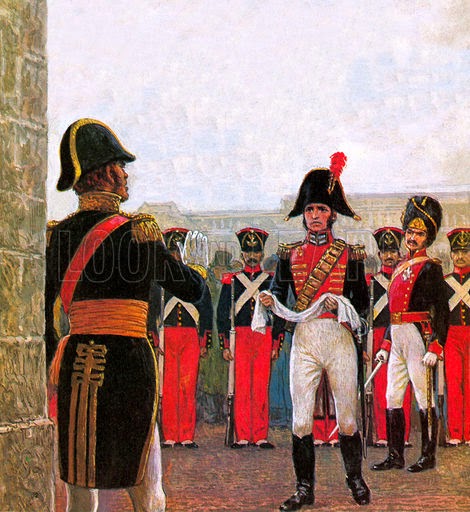Victoria, here. I’ve been doing a bit of research on the Battle of Waterloo and the Duke of Wellington lately. I can’t get enough of either topic!! Things are getting so exciting for the 200th anniversary of the battle next June — with all the exhibitions and events — most of which you will learn about here on this blog — sooner or later.
Ordinarily I don’t have a great deal of affection or sympathy for the French side. Napoleon — well, he has plenty of apologists and groupies, so he doesn’t need me.
But what about some of his generals? While he was in exile on St. Helena, Napoleon ranted and raved about the causes of his defeats, taking no responsibility for his own leadership but usually blaming others, especially his generals.
This is the 199th “anniversary” of the execution of Marshall Michel Ney, the Bravest of the Brave, by a firing squad in Paris on December 7, 1815.
Ney was born in 1769 to a modest family and had a good education, becoming a minor clerk and mine inspector. But in 1787, he joined the army as a Hussar, and was rapidly promoted through the ranks, fighting in numerous battles. He became a commissioned officer in 1792 and was made a general five years later, leading various cavalry units.
He continued his promotions, became a Marshal of the Empire, fighting in Austria and Spain, defeating the British several times in Portugal until he was forced to retreat from Wellington’s fortifications at Torres Vedres.
Ney commanded the Third Corps in Napoleon’s invasion of Russia in 1812. Despite being wounded in the neck, one of many he received in his lifetime, he continued to fight and led the rear-guard, known as the last Frenchman to leave Russia. Napoleon named his Prince de la Moskowa, though he was always known as Marshal Ney.
After Russia, Ney led troops in many of Napoleon’s battles but eventually became the leader of the general’s revolt and told Napoleon at Fontainebleau in 1814 that French troops refused to march on Paris, and that the Emperor should abdicate.
After Napoleon went to Elba, Ney became a leader of Louis XVIII’s army. When Napoleon returned to France in 1815, Ney led forces to stop him, but when he met Napoleon once more, he defected to the former Emperor’s side with his 60,000 troops. This was the reason Ney was tried and executed after Napoleon was defeated once more — at Waterloo.
At Waterloo, Ney had four or five horses shot from under him. Many have criticized his tactics, but no one doubted his bravery in battle. Supposedly, as the Imperial Guard retreated, he dared someone to shoot him. “Come and see how a French Marshal dies,” he supposedly shouted. But, amazingly, he was not seriously injured.
Ney was arrested and tried by the Chamber of Peers on December 4, 1815. He was age 46.
According to legend, he refused to wear a blindfold and gave the order to fire himself, saying,
“Soldiers, when I give the command to fire, fire straight at my heart. Wait for the order. It will be my last to you. I protest against my condemnation. I have fought a hundred battles for France, and not one against her … Soldiers, fire!”
A statue of Ney was erected in Paris in 1853, standing on rue de l’Observatoire, across from the Closerie des Lilas Cafe, remembered as a favorite haunt of Ernest Hemingway.



.jpg)






I'm ambivalent about Marshal Ney. He was brave, but also foolhardy and impulsive. I do think he mismanaged his part of the Waterloo battle.
And I understand why he was executed, although I don't like it. He defected from the army to whom he swore his allegiance when he switched sides to fight with Napoleon.
I think Wellington was against Ney's execution and spoke on his behalf.
Chilling story.
I think he was an idealist. He was obviously a brave soldier and smart enough to be a capable tactician. I think he wanted to believe in something better and those he chose to believe in were forever disappointing him. Very sad waste.
Ney was rather an enigma — and Diane, I think you re right — Wellington tried to prevent many anti-French acts and I believe trying to save Ney was one of them. Certainly the Prussians were eager to simply shoot Napoleon (and who can blame them?) but the Duke prevailed.